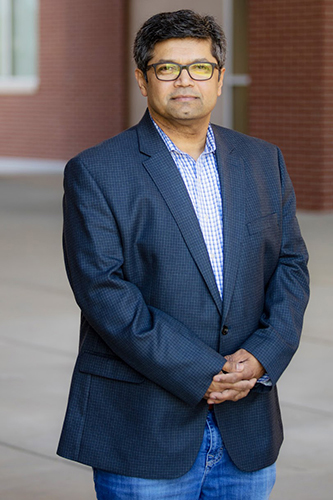Biology
WKU Biology professor receives two KY NSF EPSCoR Research awards
- Tuesday, February 14th, 2023

We are pleased to share that Dr. Ajay Srivastava, Professor in the WKU Department of Biology and Associate Director of the WKU Applied Research and Technology Program has received two KY NSF EPSCoR grants.
The first award granted to Dr. Srivastava was a KY NSF EPSCoR Research Award for his proposal titled Further Characterization of a Basement Membrane Associated Protein encoding Gene in Drosophila melanogaster.
A basement membrane (BM) is an evolutionarily conserved, specialized form of extracellular matrix (ECM) that is found surrounding many types of cells on their basal sides. This specialized ECM is assembled from interactions between major protein components like collagen IV, nidogen/entactin, laminin and proteoglycans. In addition to providing structural support, BMs also play important roles in tissue morphogenesis, tissue integrity, and disease pathogenesis. Furthermore, tissue integrity is compromised when either the BM components are defective or their biogenesis is impaired, thus resulting in improper assembly of the BM. While these facts about BM are known, what contribution proteins associated with BM make to BM integrity and thereby tissue integrity, normal development and invasive behavior is relatively unknown. The overarching goal of Dr. Srivastava’s proposal is to test the hypotheses, 1) that BM associated proteins are essential for BM and tissue integrity, and 2) that BM associated proteins contribute to development by signaling to nearby cells.
It is expected that this study will shed light on BM biology and the role of this BM associated protein encoding gene in tissue and BM integrity. These data could be useful to studies in tissue engineering and regenerative biology given that ECM derived scaffold is critical for these processes.
Dr. Srivastava was also granted a KY NSF EPSCoR Research Instruments and Equipment (RIE) Award for his proposal titled Acquisition of a Stereo Fluorescence dissection microscope for matrix centered research projects in the Srivastava lab at WKU.
Funds were granted with this proposal to acquire a fluorescence stereo dissection microscope for use in research activities in Dr. Srivastava’s lab. This microscope will have the capability to visualize Green Fluorescent Proteins, Red Fluorescent Proteins, DAPI to visualize nuclei, and setup for brightfield microscopy. Research activities in the Srivastava lab are focused on understanding the BM biology as it relates to normal development of an organism. In addition to providing structural support, BMs also play important roles in directing cellular behaviors during development. Knowledge gained from studies of ECMs and BMs have provided important insights into their use as scaffolds during tissue engineering and regenerative biology. Dr. Srivastava’s goal is to understand the BM function by focusing on three broad approaches. These approaches attempt to 1) characterize cathepsin proteases that modify the ECM, 2) use a genetic screen to isolate BM degraders, and 3) isolate and characterize proteins that associate with BMs and thereby play a role in their integrity. Much of the research activity in Dr. Srivastava’s lab utilizes genetic and immunohistochemical techniques involving fluorescent proteins bearing transgenic flies and fluorescent molecules. Acquisition of this dissection microscope will greatly facilitate the research operations in the lab by making this workhorse equipment readily. It is our hope that knowledge gained in the lab could be utilized by researchers in the fields of Tissue Engineering and Regenerative Biology.
Some of the links on this page may require additional software to view.

